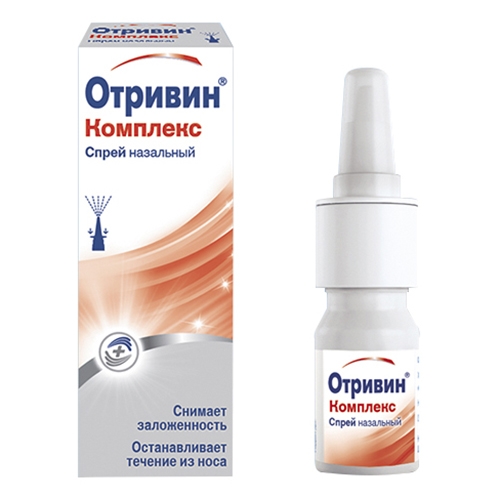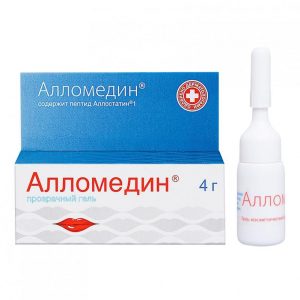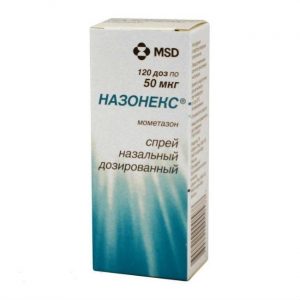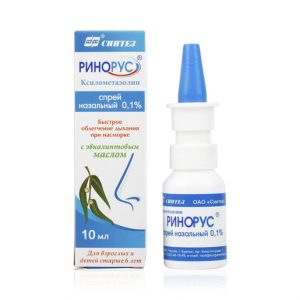Description
Product Overview
Otrivin Nasal Spray Complex.
Contains 2 active ingredients: a vasoconstrictor component that reduces swelling and nasal congestion, and an anticholinergic component that stops the flow from the nose. Helps to fight immediately with 3 symptoms: nasal congestion, swelling of the mucous membrane, flow from the nose.
Starts acting after 5-10 minutes. It has a lasting effect for 6-8 hours *.
* Instruction for medical use, RU No. LP-002976 dated 04/27/2015
Description
Nasal spray in the form of a clear, colorless or slightly colored solution, practically odorless.
Release form
10 ml of the drug in a PVP bottle, equipped with a pump-operated metering device with a tip made of polypropylene and a protective cap made of polyethylene.
The bottle, along with instructions for use, is placed in a cardboard box.
Pharmacological action of
Xylometazoline belongs to the group of local vasoconstrictors (decongestants) with alpha-adrenomimetic action, causes narrowing of the blood vessels of the nasal mucosa, thereby eliminating edema and hyperemia of the mucous membrane of the nasopharynx. Relieves congestion, facilitating nasal breathing in rhinitis.
ipratropium bromide has an anticholinergic effect. With intranasal administration, it reduces nasal secretion, stopping the flow from the nose due to competitive inhibition of cholinergic receptors located in the epithelium of the nasal cavity.
In therapeutic concentrations, does not irritate the mucous membrane, does not cause hyperemia.
The drug begins to act after 5-10 minutes and has a lasting effect for 6-8 hours.
Indications
Symptomatic treatment of edema and hyperemia of the nasal cavity, acute respiratory infections with rhinitis (runny nose), accompanied by congestion, acute allergic rhinitis, hay fever, sinusitis.
Contraindications
Hypersensitivity to the drug, hypersensitivity to atropine or similar compounds (hyoscyamine, scopolamine), glaucoma, surgery on the lining of the brain (history), pregnancy (I trimester), atrophic rhinitis, up to 18 years of age.
Precautions
Diabetes mellitus, hyperthyroidism, pheochromocytoma, functional class III IV angina, obstruction of the bladder neck, prostatic hyperplasia. Caution is advised in the treatment of patients predisposed to nosebleeds, dizziness, skeletal muscle tremors, sleep disturbances, arrhythmias, increased blood pressure, paralytic bowel obstruction and patients with cystic fibrosis.
If you have one of these diseases, be sure to consult your doctor before taking the drug.
Use during pregnancy and lactation
The use of the drug during pregnancy and during breastfeeding is contraindicated.
Composition
Active ingredients:
Ipratropium bromide monohydrate 0.6 mg, xylometazoline hydrochloride 0.5 mg
Excipients:
Glycerol (85%) 27.9 mg,
disodium edetate dihydrate 0.5 mg,
hydrochloric acid concentrated to pH 4.5,
sodium hydroxide to pH 4.5,
water to 1 ml.
Dosage and Administration
Intranasally.
For patients over the age of 18: 1 injection in each nasal passage 3 times a day. The drug is used for no more than 7 days without consulting a doctor. Long-term use of xylometazoline can cause swelling of the nasal mucosa and increased secretion, which is due to the development of increased sensitivity of cells to the active ingredients of the drug, the so-called inverse effect.
One injection of Otrivin ® Complex contains about 70 mcg xylometazoline hydrochloride and 84 mcg ipratropium bromide.
Side effects
Classification of the frequency of adverse reactions: very often, more than 1/10 of the prescriptions ( 10%) often – more than 1/100, but less than 1/10 of the prescriptions ( 1%, but 10%) infrequently – more 1/1000, but less than 1/100 appointments ( 0.1%, but 1%) rarely – more than 1/10000 appointments, but less than 1/1000 appointments ( 0.01%, but 0.1%) very rarely – less than 1/10000 appointments ( 0.01%).
From the nervous system:
Often: headache
Rarely: dizziness
Very rarely: insomnia.
From the digestive system:
Often: dry mouth
Infrequently: dyspepsia, nausea.
On the part of the sensory organs:
Rarely: increased intraocular pressure, mydriasis, eye pain, worsening with angle-closure glaucoma
Very rarely: impaired visual perception. From the urinary system:
Rarely: difficulty urinating.
From the respiratory system:
Often: nosebleeds, irritation and / or dryness of the mucous membrane of the nasopharynx, burning sensation, tingling, sneezing, nasal hypersecretion
Infrequently: nasal congestion (with frequent and / or prolonged use of the drug).
From the cardiovascular system:
Rarely: heart palpitations, supraventricular tachycardia, atrial fibrillation
Very rarely: arrhythmic pulse.
From the skin:
Rarely: itching, skin rash, urticaria.
Allergic reactions:
Rarely: systemic allergic reactions (anaphylactic reaction, angioedema of the tongue, lips and face, laryngospasm).
If any of the side effects indicated in the instructions are aggravated, or you notice any other side effects not listed in the instructions, inform your doctor.
Drug Interaction
The drug is incompatible with monoamine oxidase inhibitors, tri- and tetracyclic antidepressants. Sympathomimetic drugs cause the release of catecholamines, including norepinephrine, which has a vasoconstrictor effect, resulting in increased blood pressure. With a significant increase in blood pressure, treatment with Otrivin ® Complex should be discontinued and symptomatic treatment should be performed.
Co-administration with tri- and tetracyclic antidepressants may enhance the sympathomimetic effect of xylometazoline.
With the concomitant use of other drugs with anticholinergic activity, the anticholinergic effect and ipratropium bromide may be enhanced.
overdose
With nasal administration of Otrivin ®, an acute overdose is unlikely, since absorption of the drug is extremely insignificant.
In the case of xylometazoline overdose, the clinical picture is characterized by: nausea, sweating, fever, headache, bradycardia, disturbance of accommodation, hypertension, respiratory depression, coma. Hypertension can be replaced by hypotension. Symptomatic therapy should be performed under the supervision of a physician.
Over-use of ipratropium bromide overdose is unlikely due to the extremely low absorption of the substance into the blood, but dry mouth, difficulty in accommodation, tachycardia may develop. Treatment is symptomatic.
A significant overdose can cause symptoms related to the cholinolytic action of the drug by the CNS, including hallucinations, which are prescribed by cholinesterase inhibitors.
Storage conditions
At a temperature not exceeding 25 ° C.
Keep out of the reach of children.
Expiration
3 years. Do not use after the expiry date stated on the packaging.
Terms of sale from pharmacies
Over-the-counter
Dosage form
Dosage form
nasal spray
GSK Consumer Helsker SA, Switzerland




